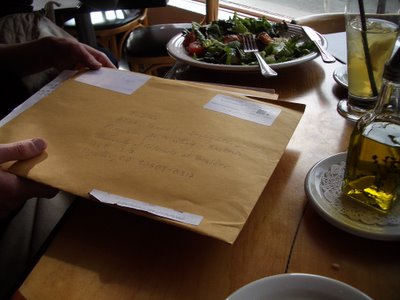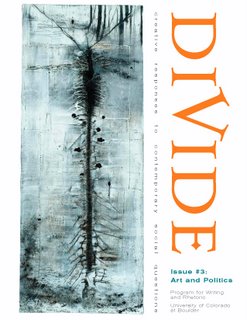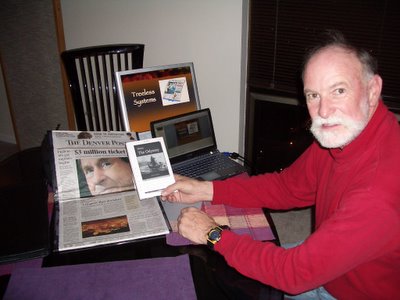A Low-Tech Life of Generous Simplicity

Alim Akhtar, a 14-year concierge at the Barclay, is never interrupted at home by the phone, or distracted by a TV or computer, or weighed down by the care and feeding of an automobile. For the past 12 years, he has lived in America with none of these modern conveniences, the better to enjoy peace at home during scant time off from his two jobs, and the better to save 80 percent of his income to support extended family in Pakistan, including a niece whom he has supported all the way through medical school. I was, quite frankly, hugely inspired by Alim's matter-of-fact description of his life during this podcast, which also appears on "The Barclay Show" at the Barclay Towers site:
Saturday, January 14, 2006
A Juror's Poem
UPDATE 1/14/06: Because the YouTube audio and video were so poorly synchronized, I replaced the vlog with a feed from Audioblog.com, and it seems to work much better.
I ran into ace Denver trial attorney Greg Tiemeier yesterday at Players men's clothing store. He was buying some very colorful shirts, and I was trying on a sportscoat. Just a few days before, Greg had read about a Colorado Lawyer magazine poetry contest and remembered the poem I had written early this year after serving as a juror at one of his trials. The videoblog shows me reading "All Rise," and contains one error: the contest is being run by the state Bar Association, not the national. Being new at YouTube, I don't know how to make the audio and video synchronize any better--my apologies for the irritating delay. It will no doubt lead me to my next podcast-related purchase, a movie editing program. It never ends.
Thanks, Greg, for sending the poem on to the magazine for consideration in the contest!
ALL RISE
We the jury
turn right, step
down from our box,
walk left along
a long, smooth rail
past a coat closet,
to the door
of a tall room
with an oak table.
Everyone else
stands still—
the robed judge,
the accused optometrist,
his trim attorney,
the red-haired plaintiff
whose eyes aren’t right,
his loose-limbed lawyer,
the petite law clerk,
the woman who sits
alone in the gallery.
Except for my wedding,
I have never walked
as heedfully
as I walk
to this table
where we five strangers
conjure from the law
and our own guilty lives
a verdict,
a stumbling
toward justice.
Friday, January 13, 2006
You Never Listen...
Thanks to Kris Krug, I found out about about YouTube, a video sharing site. This first video blog or vlog comprises an unauthorized recording of my wife (for which I will pay later), and a brief tour of the apartment. For some reason the audio lags the video slightly.
A Literary Lunch in Boulder

It was one of those "I'll be wearing a black wool hat" meetings for lunch today in Boulder. After months of mainly e-mail conversations with Divide magazine editor Ginger Knowlton, I invited her to join me at the 14th Street Grill for a podcast about the current issue. It's a really good issue, and not just because Ginger had the good taste to accept a poem of mine for publication. The theme of the issue is Art and Politics. It naturally includes an essay about Dana Gioia, head of the National Endowment for the Arts, as well as poignant remembrances of the Velvet Revolution in Czechoslovakia.

In the podcast, Ginger relates how the strength of the submissions from overseas showed her how, by comparison, much art in the U.S. seems to be adrift because it is not linked to a strong purpose, political or otherwise.
[Update (1/13/06): Ginger in an e-mail corrected my previous summary of her comments. She didn't intend to say or imply that American art seems flat, only that it was the body of overseas submissions that reminded her that political art, too, can be so enlivening.]
I was all set for the usual MHPC portrait photo, which would have been smashing with the light coming in from the big windows. But Ginger turned out to be as shy regarding photos as she is bold as an editor, so we settled for a shot of her hands holding one of the manuscript submissions she had with her. Her next issue will be on the theme of Travel & Enlightenment.
We had a great lunch, but the restaurant turned out to be very popular, resulting in much more background noise than I would have liked on the recording. Ginger was a good sport, diving in even before she knew exactly what a podcast was.
Here's the audio:
Tuesday, January 10, 2006
A Pause for Pod-flection
I posted my first podcast 28 days ago at the iTunes Music Store. Since then I have added seven more to The Barclay Show and another nine to the Mile High Pod Chronicles. I have begun to think in podcast, listening to sounds that might make good background, imagining that I am taping a conversation and trying to weed out ums and ahs, plotting my next two or three episodes, and counting the hours until I get my hands on a new M-Audio MicroTrack 24/96, the digital recorder that will considerably crank up the quality of my audio.
Steve Borsch, who has a great blog and podcast called Connect the Dots, noted recently that there are about 24 million blogs in the U.S. and only 15,000 podcast episodes available. Darren Barefoot, another sage whose blog I follow, posted a sensible wait-a-minute consideration of podcasting, in which he suggested it won't see the same growth as blogs. I think Darren is right that the podcasting learning curve is much steeper than the gentle ascent available through Blogger or any of the other blog platforms. But wouldn't that be easy to fix? I can imagine buying a Pentax Optio camera with software on a CD that enables you to take the SD card with a photo and recording on it and with a couple of clicks of your mouse have it posted to iTunes and other pod purveyors. It's still not everyone's cup of chai to turn on a microphone and start speaking, but likewise it wasn't the most natural thing to confront a blank screen and type words that in seconds can be found via Google by a stranger in Finland. Yet 24 million people are doing it.
All I can say is that I'm hooked. I see podcasting as a new art form, and I feel like one of the first few thousand Neanderthals who figured out you could create images of bison on the walls of caves.
As compared with blogging, podcasting is more time-intensive for the audience. You can't scan 20 podcasts while you are checking your e-mail or talking on the phone, the way you can check in with your Bloglines feeds. But by the same token, you can't read blogs when you're jogging or driving in the car. This morning I took Steve Borsch with me on my walk to a meeting and enjoyed a podcast that included his reverent recitation of this quote from Winston Churchill:
"Every day you may make progress. Every step may be fruitful. Yet there will stretch out before you an ever-lengthening, ever-ascending, ever-improving path. You know you will never get to the end of the journey. But this, so far from discouraging, only adds to the joy and glory of the climb."
Steve Borsch, who has a great blog and podcast called Connect the Dots, noted recently that there are about 24 million blogs in the U.S. and only 15,000 podcast episodes available. Darren Barefoot, another sage whose blog I follow, posted a sensible wait-a-minute consideration of podcasting, in which he suggested it won't see the same growth as blogs. I think Darren is right that the podcasting learning curve is much steeper than the gentle ascent available through Blogger or any of the other blog platforms. But wouldn't that be easy to fix? I can imagine buying a Pentax Optio camera with software on a CD that enables you to take the SD card with a photo and recording on it and with a couple of clicks of your mouse have it posted to iTunes and other pod purveyors. It's still not everyone's cup of chai to turn on a microphone and start speaking, but likewise it wasn't the most natural thing to confront a blank screen and type words that in seconds can be found via Google by a stranger in Finland. Yet 24 million people are doing it.
All I can say is that I'm hooked. I see podcasting as a new art form, and I feel like one of the first few thousand Neanderthals who figured out you could create images of bison on the walls of caves.
As compared with blogging, podcasting is more time-intensive for the audience. You can't scan 20 podcasts while you are checking your e-mail or talking on the phone, the way you can check in with your Bloglines feeds. But by the same token, you can't read blogs when you're jogging or driving in the car. This morning I took Steve Borsch with me on my walk to a meeting and enjoyed a podcast that included his reverent recitation of this quote from Winston Churchill:
"Every day you may make progress. Every step may be fruitful. Yet there will stretch out before you an ever-lengthening, ever-ascending, ever-improving path. You know you will never get to the end of the journey. But this, so far from discouraging, only adds to the joy and glory of the climb."
Monday, January 09, 2006
Hope for the Trees

Occasional neighbor Dave Lester holds a Sony Librié, a svelte e-book just introduced at the Consumer Electronics Show in Las Vegas. The Librié uses a new screen technology which Dave is working with for an even more exciting project--a flexible, newspaper-size screen which will receive whatever newspaper you like via a cellular phone signal. He estimates that his venture, Treeless Systems, is about three years from a commercial release of the product.

I was an early adapter of the RocketBook when it came out about eight years ago. It was a terrific breakthrough, but its fate was to pave the way for better e-books as opposed to creating a new standard itself. For the past several years I've simply read ebooks on my Pocket PC in the very good Microsoft Reader format. But this Sony that Dave showed me (shown at right) was featherweight, and you could read the screen no matter what angle you were looking at it from, like the Mona Lisa's smile.
I happened to hear Andy Bower's Slate podcast recently of a rant by Michael Kinsley, a college classmate of mine. Kinsley did a great job making the whole process of making information out of trees sound ridiculous. And when Dave Lester talked tonight about how you will be able to use a Treeless Systems newspaper to see video on the page as well as print, not to mention having the newspaper read itself via your car stereo on the way to work, well that sounded a lot better than whacking more trees.
Here's the podcast:
